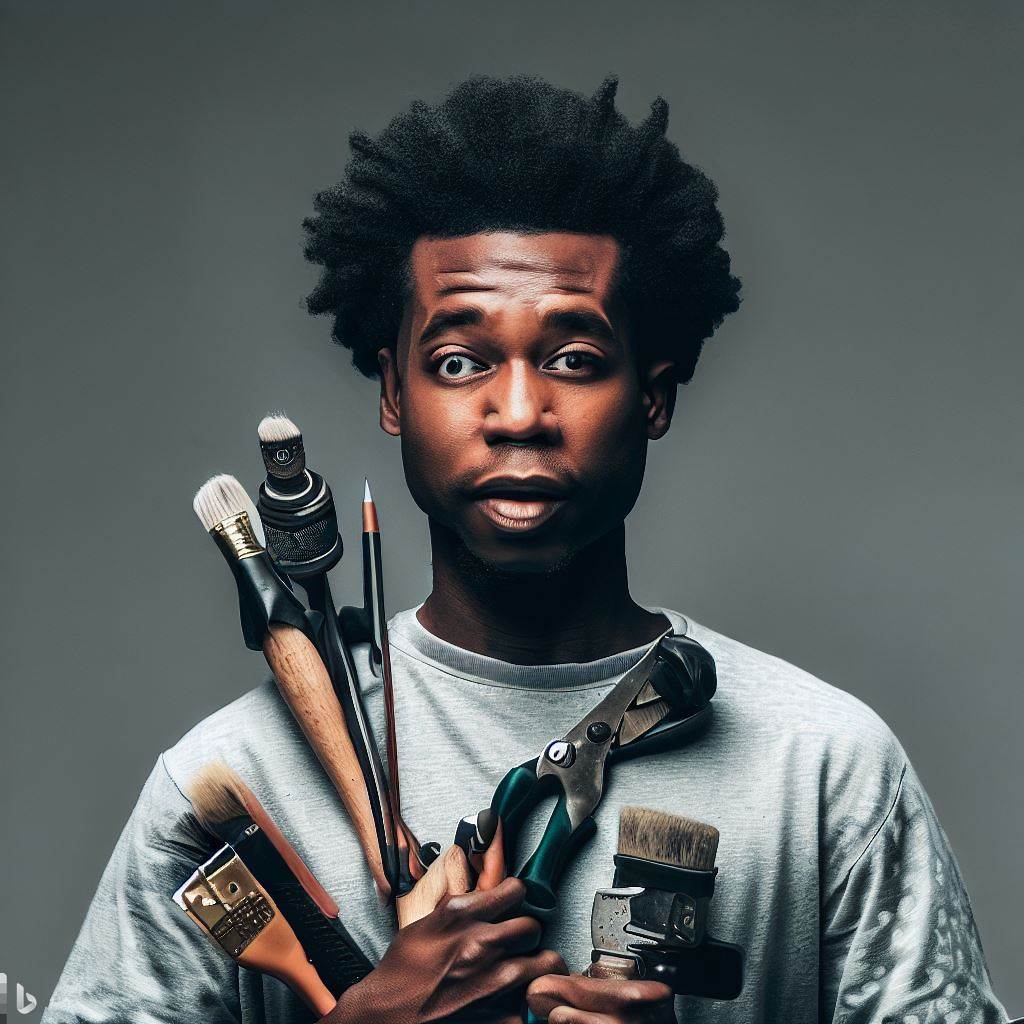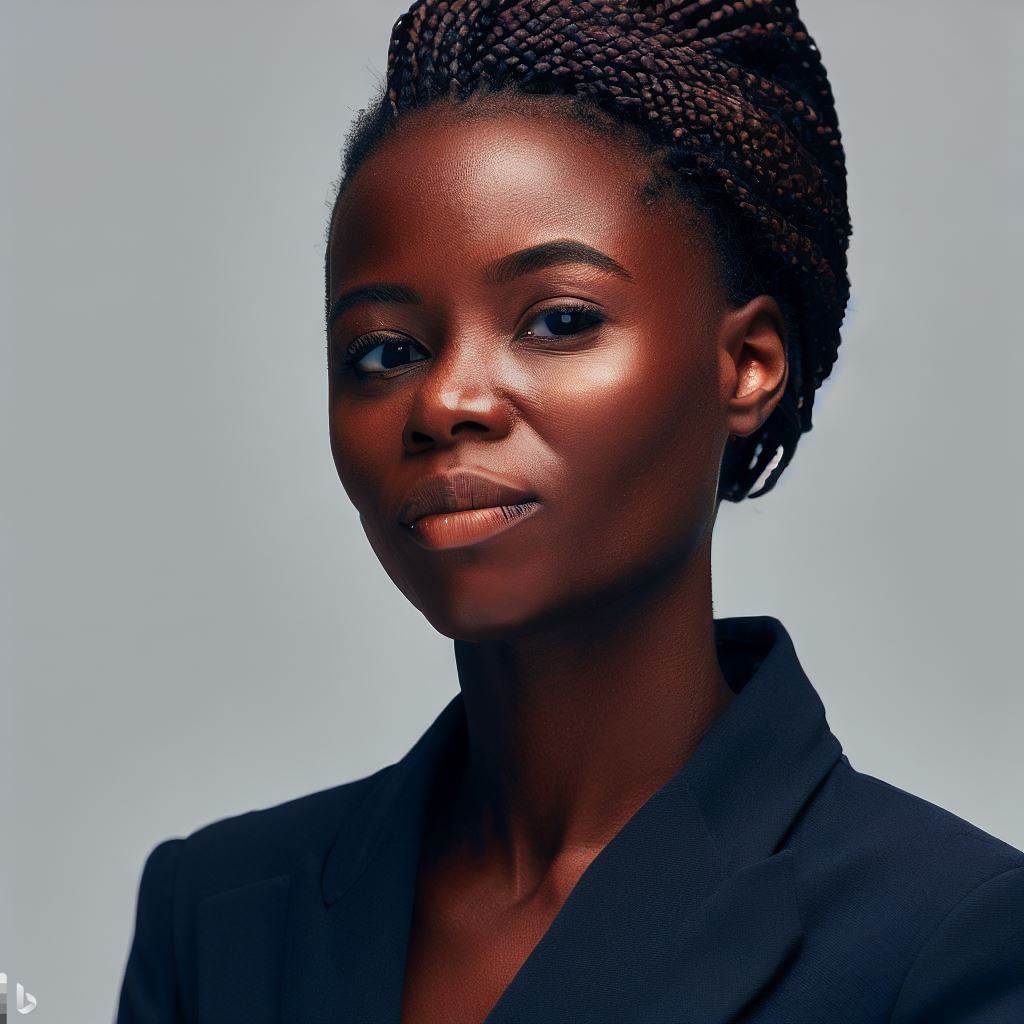Introduction
Let’s explore freelancing as a production designer in Nigeria’s scene
In Nigeria’s entertainment scene, freelancing as a production designer is a dynamic and growing career path.
Freelancing refers to an individual working independently, without being employed by a specific company, and offering their skills and services on a project basis.
As a production designer, the role involves creating the visual concept and look of a film, TV show, or other media productions.
It requires a strong understanding of design principles, attention to detail, and the ability to bring a director’s vision to life.
Nigeria’s entertainment industry has experienced significant growth in recent years, becoming a major player in Africa and globally.
Nollywood, the country’s prolific film industry, produces thousands of movies each year and has gained international recognition.
The industry offers diverse opportunities for freelancers, with a wide range of productions being produced across various genres.
From blockbuster movies to television series and commercials, there is a constant demand for creative and talented production designers.
With the rise of streaming platforms and online content creation, there are even more avenues for freelancers to showcase their skills and find work.
Social media platforms like Instagram and YouTube have become essential tools for self-promotion and connecting with potential clients.
As Nigeria’s entertainment industry continues to thrive, freelancing as a production designer offers both creative freedom and the opportunity to contribute to the growth and development of the country’s vibrant entertainment scene.
Overview of the role of a production designer
- Collaborates with directors and producers to create the overall visual style of a film or TV production.
- Responsible for designing and overseeing the construction of sets, props, and costumes.
- Works closely with the art department to ensure that the production design aligns with the director’s vision.
- Conducts research to gather inspiration and references for the design concept.
- Creates concept sketches and production drawings to communicate ideas to the team.
Responsibilities and skills required for a production designer
- Must have a strong background in art, design, and architecture.
- Excellent communication and collaboration skills to work effectively with the director and the art department.
- Ability to visualize and translate ideas into practical designs.
- Keen attention to detail to ensure accuracy and continuity in the visual elements.
- Proficiency in computer-aided design (CAD) software and other design tools.
- Knowledge of various design styles, historical periods, and cultural references.
- Budgeting and resource management skills to ensure the efficient use of resources.
- Flexibility to adapt to changes and problem-solving skills to overcome challenges during the production process.
Importance of a production designer in the production process
- Sets the visual tone and atmosphere of the production, enhancing the storytelling experience.
- Helps to create a cohesive and immersive world for the characters, enhancing the audience’s engagement.
- Plays a crucial role in shaping the overall aesthetic and mood of the production.
- Oversees the construction and organization of sets, ensuring that they are functional and visually appealing.
- Manages the procurement and allocation of resources, optimizing the production’s budget.
- Provides guidance and support to the art department team, fostering a collaborative and creative environment.
In fact, the role of a production designer in Nigeria’s scene is vital in bringing visual elements to life.
Their responsibilities include collaborating with the director, designing sets, props, and costumes, conducting research, and creating concept sketches.
The skills required include strong artistic abilities, communication skills, attention to detail, and proficiency in design tools.
The production designer’s importance lies in setting the visual tone, enhancing storytelling, and creating a cohesive and immersive world for the audience.
They play a crucial role in shaping the overall aesthetic and mood of the production, managing resources, and providing support to the art department team.
Read: Impact of Culture on Child Care Provision in Nigeria
Pros and cons of freelancing as a production designer in Nigeria
Pros of freelancing as a production designer in Nigeria
- Flexible work schedule allows for better work-life balance.
- Autonomy to choose projects and clients based on personal preferences and interests.
- No need to adhere to strict office hours or commute daily.
- Opportunity to work on diverse projects in different industries and gain varied experience.
- Ability to set competitive rates and negotiate payment terms.
- Possibility of earning higher income compared to a full-time job.
- Independence to develop a personal brand and style as a production designer.
- Networking opportunities with professionals in the industry.
- Access to a global marketplace through online platforms.
Cons of freelancing as a production designer in Nigeria
- Inconsistent work opportunities may lead to periods of unemployment or financial instability.
- Competition can be fierce, making it challenging to secure projects or clients.
- Payment issues are common, with clients delaying or refusing to pay for completed work.
- Managing finances and taxes becomes the responsibility of the freelancer.
- Administrative tasks such as contract negotiation, invoicing, and client communication can be time-consuming.
- Lack of benefits such as health insurance, retirement plans, and paid leave.
- Isolation from colleagues and limited opportunities for collaboration and feedback.
- Constant need to market oneself and actively seek new projects to maintain a steady income.
- Unpredictable workloads and tight deadlines can lead to stress and burnout.
- Difficulty in establishing trust and building a solid reputation in the industry.
Despite the challenges, the flexibility and autonomy that comes with freelancing as a production designer in Nigeria can be rewarding.
With careful planning, networking, and continuous skill development, freelancers can overcome the cons and thrive in this dynamic industry.
Read: Training and Qualifications for Nigerian Child Care Providers
Steps to become a freelance production designer in Nigeria
In Nigeria’s scene, freelancing as a production designer can be a rewarding career path. Here are the steps to becoming a freelance production designer in Nigeria:
1. Education and training requirements
First, acquire a formal education in design or related fields such as fine arts or theater arts. This will provide you with a solid foundation in design principles and techniques.
Consider pursuing a degree or diploma program that focuses specifically on production design.
2. Building a portfolio
Start creating a portfolio of your work to showcase your skills and abilities as a production designer. Include a variety of projects that highlight your versatility and creativity.
This could include set designs, props, costumes, or even storyboard illustrations. Your portfolio should be well-organized and visually appealing.
3. Networking and industry connections
Connect with professionals in the Nigerian film and entertainment industry. Attend industry events, film festivals, and workshops to meet directors, producers, and other creatives.
Building a strong network of contacts can lead to job opportunities and collaborations.
4. Join professional organizations
Consider joining professional organizations such as the Nigerian Film Corporation or the Association of Movie Producers.
These organizations provide networking opportunities, resources, and support for freelancers in the industry. Membership can also enhance your credibility as a production designer.
5. Market yourself
Develop a strong online presence by creating a professional website or portfolio platform where potential clients can easily find and view your work.
Utilize social media platforms such as Instagram, Facebook, and LinkedIn to showcase your projects and connect with potential clients.
Engage with the online design community by participating in forums and sharing your expertise.
6. Seek freelance opportunities
Look for freelance production design opportunities by networking with directors, producers, and production companies.
Attend auditions, casting calls, and pitch meetings to showcase your skills and offer your services. Be proactive in seeking out projects and make sure to promote yourself effectively.
7. Continuous learning and improvement
Stay updated with the latest design trends, technology, and techniques by attending workshops, seminars, and online courses. Continuously improve your skills and expand your knowledge to stay competitive in the industry.
8. Deliver quality work
As a freelance production designer, ensure that you always deliver high-quality work. Meet deadlines, demonstrate professionalism, and strive for excellence in your designs.
Satisfied clients will lead to positive word-of-mouth references and repeat business.
9. Collaborate and learn from others
Take advantage of opportunities to collaborate with other creatives in the industry. Learn from experienced production designers and seek out mentors who can guide you in your career.
Collaboration can lead to new insights, skills, and growth as a designer.
10. Stay motivated and resilient
Freelancing can have its challenges, including periods of uncertainty and competition. Stay motivated, believe in your skills, and be resilient in pursuing your career as a production designer.
Consistency, persistence, and a positive attitude will ultimately lead to success.
Becoming a freelance production designer in Nigeria’s scene requires a combination of education, networking, skill development, and perseverance.
By following these steps and continuously honing your craft, you can carve out a successful career in this creative and dynamic field.
Read: Salary Expectations for Child Care Providers in Nigeria

Opportunities for freelance production designers in Nigeria’s scene
Freelancing as a production designer in Nigeria’s scene can offer numerous opportunities for professionals in the industry.
With the booming Nollywood and its growing demand, rising international collaborations, and special events and live productions, the freelance market in Nigeria is thriving
Nollywood, the Nigerian film industry, is one of the largest in the world, providing a constant stream of projects and potential clients.
The increasing recognition of Nollywood globally has led to collaborations with international production companies, opening doors for freelance designers.
International collaborations bring fresh perspectives and higher production values, requiring the expertise of production designers.
The demand for unique and visually appealing productions has created a niche for skilled freelance production designers.
Special events such as award shows, fashion shows, and live performances often require the services of production designers, offering additional opportunities
Nollywood and its growing demand
Nollywood has witnessed exponential growth over the years, resulting in a higher demand for production designers. With hundreds of films produced annually, freelance designers are in constant need.
As Nollywood gains international recognition, the demand for better aesthetics and production quality increases.
This provides a platform for freelance production designers to showcase their skills and make a significant impact.
Rising international collaborations
With the rise in international collaborations, freelance production designers in Nigeria have the chance to work on projects with global reach.
Collaborations bring together diverse creative minds and resources, elevating the quality of productions.
This trend also provides an opportunity for production designers to expand their network and gain valuable experience, working alongside industry professionals from different cultural backgrounds.
Special events and live productions
Special events and live productions require meticulous planning and attention to detail. Freelance production designers play a crucial role in creating captivating visuals that enhance the overall experience.
From designing stage sets to lighting arrangements, production designers have the opportunity to showcase their creativity and contribute to the success of these events.
Special events, such as award shows, often attract industry professionals and influential individuals, offering freelancers a chance to network and establish valuable connections.
In essence, freelancing as a production designer in Nigeria’s scene presents exciting opportunities.
With the thriving Nollywood industry, rising international collaborations, and special events, freelance designers have ample chances to showcase their skills and grow professionally.
The demand for visually appealing productions continues to rise, positioning production designers as essential contributors to the success of various projects.
Tips for success as a freelance production designer in Nigeria
- Develop a strong portfolio showcasing your skills and creativity in production design.
- Stay updated on the latest trends and techniques in production design through continuous learning.
- Network with other professionals in the industry to gain exposure and potential clients.
- Offer competitive pricing for your services to attract clients, especially when starting out.
- Maintain a high level of professionalism and deliver quality work to build a good reputation.
- Collaborate with other freelancers or professionals on projects to expand your skills and connections.
- Stay organized by keeping track of your projects, deadlines, and finances.
- Constantly market yourself and promote your work through social media, a website, or industry events.
- Provide excellent customer service and go the extra mile to exceed client expectations.
- Stay adaptable and be open to taking on new challenges and projects that may enhance your portfolio.
Marketing and branding oneself as a freelance production designer
- Create a personal brand that reflects your unique style and strengths as a production designer.
- Create an online presence by building a professional website and maintaining active social media profiles.
- Showcase your work through your portfolio, emphasizing your best projects and diverse range of skills.
- Use search engine optimization techniques to increase your visibility in online searches.
- Develop a strong personal brand by consistently delivering excellent work and satisfying clients.
- Network with industry professionals and attend relevant events to build your reputation and connections.
- Collaborate with other freelancers or agencies to expand your reach and gain exposure to new clients.
- Take advantage of online platforms and job boards specific to the production design industry.
- Ask for testimonials or referrals from satisfied clients to enhance your credibility to potential clients.
- Stay active on social media, engaging with potential clients and sharing valuable content related to production design.
Building strong relationships with industry professionals
- Attend industry events and conferences to meet and connect with professionals in the field.
- Join relevant professional organizations or associations to network with like-minded individuals.
- Participate in collaborative projects with other professionals to showcase your teamwork and skills.
- Offer help or advice to others in the industry, fostering positive relationships and goodwill.
- Maintain regular communication with industry professionals through networking events, emails, or social media.
- Be open to feedback and constructive criticism, using it to improve your skills and work.
- Collaborate with professionals from different fields to gain fresh perspectives and expand your creative network.
- Recommend or refer other professionals when appropriate, building a network of trust and reciprocity.
- Show appreciation and gratitude to industry professionals who have supported or mentored you.
- Stay connected and updated on industry trends and news to contribute to discussions and stay relevant
Time management and meeting deadlines
- Create a detailed schedule or calendar to track your projects and deadlines.
- Break down larger projects into smaller tasks and set realistic timelines for each.
- Prioritize your workload based on urgency and importance.
- Set reminders and alerts to stay on track and meet deadlines.
- Communicate clearly with clients about project timelines and manage their expectations.
- Allocate specific time slots for different projects or tasks to maximize productivity.
- Avoid procrastination by setting goals and holding yourself accountable.
- Delegate or outsource tasks when necessary to meet deadlines.
- Take breaks and practice self-care to maintain focus and avoid burnout.
- Reflect on completed projects to identify areas for improvement and refine your time management skills.
In general, freelancing as a production designer in Nigeria’s scene can be a rewarding and fulfilling career.
By following these tips for success, marketing oneself effectively, building strong relationships with industry professionals, and mastering time management, freelancers can thrive in this competitive field.
Read: Child Care Provider: Challenges and Rewards in Nigeria
Challenges and potential solutions
- Limited access to resources and equipment: Freelancers in Nigeria often struggle to find the necessary equipment and resources for production design.
This can be addressed by creating collaborative networks where freelancers can share resources and equipment. - Lack of recognition and appreciation: The production design field in Nigeria is still developing, and many freelancers face a lack of recognition for their work.
One potential solution is to create platforms and events that showcase and celebrate the work of production designers. - Limited market opportunities: Freelancers in Nigeria face a limited number of projects and clients, making it difficult to sustain a steady income.
To overcome this challenge, it is crucial for production designers to actively network, market their skills, and seek opportunities outside of traditional channels. - Inadequate payment rates: Freelancers often struggle with low payment rates and delayed payments. To address this issue, freelancers can collaborate and set industry standards for payment rates.
Additionally, signing contracts and establishing clear payment terms can help ensure prompt and fair compensation. - Obtaining contracts and legal protection: Many freelancers in Nigeria face challenges when it comes to obtaining contracts and legal protection.
Joining professional associations and seeking legal advice can provide freelancers with guidance on contract negotiation and legal protection.
Competition in the industry
- Increasing number of production designers: The industry is witnessing a rise in the number of production designers, leading to intense competition for projects.
To stand out, freelancers should continuously update their skills, stay up-to-date with industry trends, and maintain a strong portfolio. - Unique and innovative approaches: To differentiate themselves from competitors, production designers should explore unique and innovative approaches to their work.
This can include incorporating elements of Nigerian culture, experimenting with unconventional materials, or implementing cutting-edge technology. - Collaboration and partnerships: Freelancers can overcome competition by forging collaborations and partnerships with other professionals in the industry.
This not only allows for the sharing of resources but also enhances the overall quality and creativity of projects.
Addressing payment issues and contracts
- Establishing clear payment terms: Freelancers should clearly communicate their payment expectations and terms to clients before commencing any project. This includes specifying the payment schedule, method, and penalties for late payments.
- Signing contracts: To protect themselves legally and ensure fair treatment, freelancers should always sign contracts with their clients.
These contracts should outline project details, deliverables, payment terms, and intellectual property rights. - Invoicing and follow-up: Freelancers should maintain a professional approach to invoicing and follow-up on payments.
This includes sending detailed invoices, providing reminders for overdue payments, and being assertive when necessary. - Utilizing escrow services: To mitigate the risk of non-payment or payment disputes, freelancers can opt to use escrow services.
These services hold the client’s payment until the project is successfully completed, providing a level of security for both parties.
In a nutshell, freelancing as a production designer in Nigeria’s scene poses various challenges, but with proactive measures and industry-wide collaboration, these challenges can be overcome.
By addressing resource limitations, recognition issues, market opportunities, payment concerns, competition, and contract matters, freelancers can strive for success in this evolving industry.
Conclusion
In summary, freelancing as a production designer in Nigeria’s scene can be a rewarding and fulfilling career choice.
The key points discussed in this blog section include the growing demand for production design services, the flexibility and autonomy that freelancing offers, and the potential for financial growth.
Despite the challenges that may come with freelancing, such as competition and uncertain income, it is important to stay resilient and determined.
By continuously improving skills, networking with industry professionals, and showcasing one’s unique style and creativity, it is possible to succeed as a freelance production designer in Nigeria’s scene.
In brief, I encourage aspiring production designers to pursue freelancing in Nigeria.
The industry is evolving rapidly, and there are countless opportunities to showcase talent and make a name for oneself.
With dedication, perseverance, and a passion for the craft, freelancing can lead to a fulfilling and successful career in production design. So, take the plunge and embark on this exciting journey in Nigeria’s scene!




